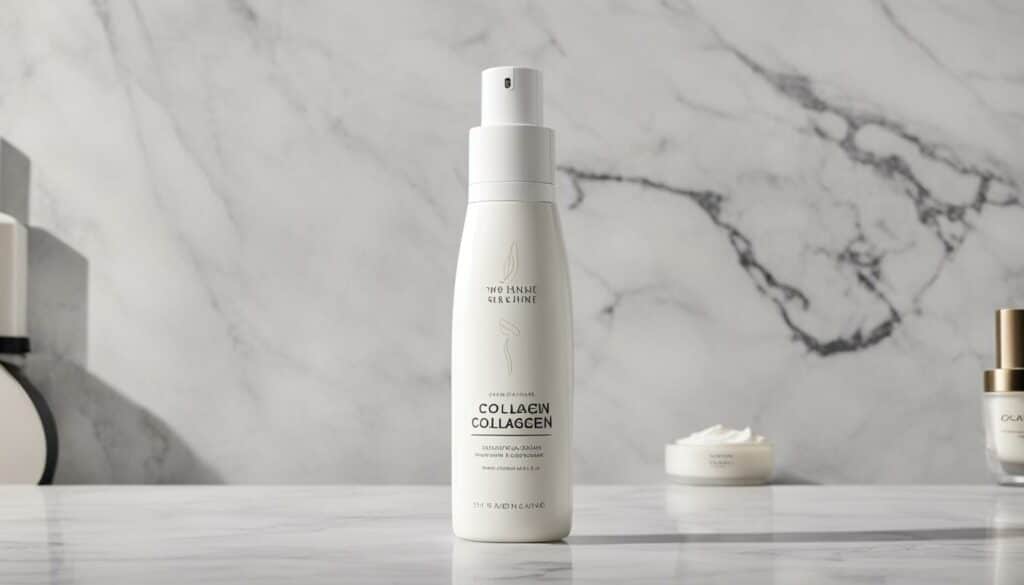Stretch marks can be unsightly and can affect our confidence. While they are common, there are ways to reduce their appearance. One such method is through the use of collagen, a protein that is naturally present in our skin. In this article, we explore the effectiveness of collagen for stretch mark reduction, including its potential benefits, the use of collagen cream for stretch marks, and the role of collagen in skin elasticity.
But first, let’s dive deeper into what stretch marks are and what causes them.
Understanding Stretch Marks and Their Causes
Stretch marks are a type of scarring that occurs when the skin stretches or shrinks rapidly. They can appear in various body parts, including the abdomen, hips, thighs, and breasts. The most common causes of stretch marks are:
- Rapid weight gain or loss
- Pregnancy
- Puberty
- Genetics
Stretch marks occur when the skin’s collagen and elastin fibers tear, leaving behind streaks of discolored skin. Over time, they may fade and become less noticeable but never disappear entirely.
So, does collagen help with stretch marks? Collagen is a protein that is essential for skin elasticity and firmness. While there is not enough scientific evidence to conclusively prove that collagen can eliminate stretch marks, some studies suggest that it may help minimize their appearance.
Collagen promotes the production of new skin cells and improves skin elasticity. When applied topically or taken as a supplement, collagen may help reduce the visibility of stretch marks and improve overall skin texture.
While collagen may offer some promise in minimizing the appearance of stretch marks, it is important to note that individual results may vary. Additionally, other factors such as diet, exercise, and hydration can also play a role in improving skin health.
Common Causes of Stretch Marks
| Cause | Description |
|---|---|
| Rapid weight gain or loss | Significant weight changes can cause the skin to stretch or shrink quickly, leading to stretch marks. |
| Pregnancy | Pregnancy is a common cause of stretch marks, as the skin stretches to accommodate the growing fetus. |
| Puberty | During puberty, rapid growth and hormonal changes can cause the skin to stretch, leading to stretch marks. |
| Genetics | Some individuals may be more prone to developing stretch marks due to genetic factors. |
Next, we will explore how collagen contributes to skin elasticity and its potential effectiveness in treating stretch marks.
The Role of Collagen in Skin Elasticity
Collagen is a protein abundant in our skin and plays a crucial role in maintaining its strength and elasticity. It is responsible for providing structural support to the skin and preventing the formation of wrinkles and fine lines. As we age, the natural production of collagen in our bodies decreases, leading to a loss of skin elasticity and the formation of stretch marks.
Stretch marks occur when the skin is stretched beyond its capacity, causing the collagen fibers to break down and weaken. This leads to the formation of scars that appear as red or purple lines on the skin’s surface. Using collagen for stretch mark treatment can effectively enhance the skin’s elasticity and reduce the appearance of stretch marks.
One study published in the Journal of Medical Nutrition and Nutraceuticals found that supplementing with collagen peptides improved skin elasticity and moisture levels. Another study published in the Journal of Cosmetic Dermatology showed that using collagen cream for stretch marks improved the skin’s firmness and texture.
While these studies show promising results, it is important to note that individual results may vary, and collagen should be combined with other treatments for optimal results. Consult with a skincare professional to determine the most effective approach for using collagen for stretch mark treatment.
Collagen Creams: Do They Really Work?
Collagen creams have become increasingly popular as a topical solution for reducing the appearance of stretch marks. But do they actually work?
Research on the effectiveness of collagen creams for fading stretch marks is limited. However, some studies suggest that collagen creams may improve overall skin texture and elasticity.
It’s important to note that the effectiveness of collagen creams for stretch mark reduction can vary depending on the product, and individual results may vary. While some users may see improvement in the appearance of their stretch marks, others may not.
Additionally, it’s important to choose a collagen cream that contains high-quality, clinically proven ingredients and to use it consistently as directed. Some popular collagen creams for stretch marks include Physician’s CHOICE and VitaMedica Unflavored.

Overall, while collagen creams may offer some potential benefits for reducing the appearance of stretch marks, it’s important to manage expectations and consider combining their use with other treatments for optimal results.
The Benefits of Collagen Supplementation
Collagen supplementation is a popular method for improving skin health and may offer potential benefits for reducing the appearance of stretch marks. Collagen supplements can come in various forms, including pills, powders, and drinks.
The main benefit of collagen supplementation is that it can help increase overall collagen levels in the body. Our collagen production naturally decreases as we age, contributing to wrinkles, sagging skin, and stretch marks. By supplementing with collagen, we can potentially improve skin elasticity, reduce the appearance of stretch marks, and promote overall skin health.
One study published in the Journal of Medical Nutrition and Nutraceuticals found that participants who were supplemented with collagen for eight weeks significantly improved the appearance of their stretch marks. Additionally, participants reported improvements in skin elasticity and hydration.

While more research is needed, these findings suggest that collagen supplementation may be a promising method for reducing the appearance of stretch marks and promoting overall skin health. However, it is important to consult with a healthcare professional before beginning any supplementation regimen.
Other Remedies for Stretch Mark Reduction
While collagen is an effective treatment for stretch marks, other remedies and treatments are available for those looking to reduce their stretch marks. Some of these remedies include:
- Retinoids: Retinoids are vitamin A found in many creams and lotions. They can help reduce the appearance of stretch marks by boosting collagen production.
- Hydration: Keeping your skin hydrated can help prevent the development of stretch marks. Drink plenty of water and apply a moisturizing lotion regularly.
- Microdermabrasion: This treatment involves removing the top layer of skin with a special tool. It can help improve the appearance of stretch marks and promote collagen production.
It’s important to note that these treatments may not be as effective as collagen for stretch mark removal and treatment. However, they can be combined with collagen for even more excellent results. Before starting any treatment, consult a skincare professional to determine the best course of action for your needs.
In addition to these remedies, you can also make lifestyle changes to help prevent new stretch marks from forming. These include:
- Staying at a healthy weight
- Eating a balanced diet
- Incorporating exercise into your routine
By making these changes, you can help promote overall skin health and reduce the appearance of stretch marks.
Conclusion
In conclusion, collagen has shown potential in reducing the appearance of stretch marks and improving skin elasticity. While some individuals may see significant improvements with collagen supplementation or topical applications, it is important to note that results may vary.
Using collagen in conjunction with other treatments and consulting with a skin care professional for the most effective approach to reducing stretch marks is recommended.
Further research is needed to understand collagen’s effectiveness for stretch mark reduction fully. However, incorporating collagen into your skincare routine may offer potential benefits for improving overall skin health and appearance.
Overall, collagen can be a valuable tool in the quest for reducing the appearance of stretch marks. Still, it should be used as part of a holistic approach to skincare and in combination with other proven remedies and treatments.
Thank you for reading, and we hope this article has provided useful insights into the effectiveness of collagen for stretch mark reduction.

